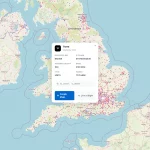ASA Bans Vodafone UK Broadband Ads After Rival ISP BT Complains UPDATE

The Advertising Standards Authority (ASA) has banned several Vodafone broadband adverts after BT lodged complaints, which claimed that the ISP was being “misleading” by claiming that customers could “switch from BT to Vodafone and get the same broadband for less” (emphasis on the “same broadband” part). But that wasn’t the only issue.
The adverts themselves – reflecting several promotions via TV, Twitter (X) and the operator’s own website – related to Vodafone’s “Great British Broadband Switch” campaign, which was launched back in March 2024 (here). But BT complained the related promotions were misleading because, they said, Vodafone’s broadband “did not provide the same performance“.
In addition, BT also complained when Vodafone suggested that “millions of BT customers across the UK are realising they can switch to Vodafone and get the same broadband for less”. BT said they did not believe millions of BT customers had switched or were considering doing so.
Advertisement
The difficulty here is that not every broadband package can truly be considered the “same” when switching between ISPs, due to differences in the bundled router, WiFi technology, the underlying network, various value-added extras and so forth. Vodafone attempted to support their generalised claims by using Ofcom’s UK home broadband performance report from 2023, which was not only old but also not fully comprehensive. Needless to say, the ASA upheld BT’s complaints.
ASA Ruling Ref: A24-1241350 Vodafone Ltd
We understood Vodafone offered six broadband plans which were comparable to BT plans: two FTTC and four FTTP. However, the Ofcom report included data on only one Vodafone broadband service – their 67 Mbps FTTC plan. While the report included data for a comparable BT service, the evidence did not relate to all six of the broadband plans included in the ads’ comparisons. The data was also collected in March 2023, one year before the ads were published.
Furthermore, we understood that the performance metric data collated in the Ofcom report was collected at the router, rather than by connected devices. We acknowledged this was a robust methodology which factored out the potential for metrics to be affected by Wi-Fi bandwidth. However, because the claims in the ads would be understood to relate to the full internet connection up to the device, rather than to the router, we considered the data did not support the claims. For those reasons, we considered the comparative data in the Ofcom report did not support the advertising claims as they would be understood by consumers.
We had not seen evidence which supported claims that BT customers who switched to Vodafone would, in practice, get nearly identical performance, including through the use of nearly identical technology. Therefore, we concluded the claims “the same broadband” and “the same broadband technology” had not been substantiated and were misleading.
…
The TV ad stated that “millions of BT customers across the UK are realising they can switch to Vodafone and get the same broadband for less”. We considered that claim would be understood by viewers to be an objective claim that millions of people had come to this realisation already and had either switched from BT to Vodafone or were actively considering doing so. We further considered that the impression that there was a growing trend of people switching from BT to Vodafone was likely to have a more persuasive effect in encouraging viewers to look into switching than if the ad had not referenced that “millions of BT customers […] are realising they can switch”.
Vodafone had said the purpose of the ad was to bring BT’s customer base to the realisation that switching could save them money. The ad itself was therefore intended to educate BT customers about Vodafone’s pricing compared to BT, rather than informing them of an evidenced trend of people switching that was already occurring. Because we had not seen evidence to substantiate the claim that millions of BT broadband customers already had switched, or were actively considering switching, to Vodafone, we concluded the claim was misleading.
As usual, the ASA banned Vodafone’s broadband adverts in their current form and warned the operator “not to state or imply that their broadband services provided a nearly identical performance to BT’s services“, or to “state or imply that millions of BT broadband customers already had switched, or were actively considering switching,” unless they held evidence to prove that.
UPDATE 9:48am
We’ve had a comment from BT / EE.
Advertisement
A BT/EE spokesperson told ISPreview:
“We are delighted with the ASA’s decision to uphold our complaint against the claims made by Vodafone in their switching campaign earlier this year.
We’re disappointed that Vodafone made inaccurate claims quoting misleading pricing comparisons and ignored the significant difference in the quality of broadband service from providers on the Openreach network.
We take serving our customers with a reliable, fast and secure connection very seriously. At BT and EE we’ve heavily invested in our network to create the best quality service for our customers. Not only that, we are also the first major UK provider to launch Wi-Fi 7, giving households higher speeds and better capacity to support devices in every corner of their home.”
Mark is a professional technology writer, IT consultant and computer engineer from Dorset (England), he also founded ISPreview in 1999 and enjoys analysing the latest telecoms and broadband developments. Find me on X (Twitter), Mastodon, Facebook, BlueSky, Threads.net and Linkedin.
« Altnet ISP Pulse Fibre Expands UK Broadband Reach via DW Utilities
London Internet Exchange Sees Record Traffic Pass 10Tbps »






















































It’s great to see this action from the ASA.
I’m now looking forward to them banning the incessant ads on Facebook and Twitter that make claims so ludicrous that they make Vodafone’s look like a paragon of virtue.
It’s very rare that I side with Vodafone, but the way I’ve interpreted the ad is that it’s the same Openreach cabling, which is true. Arguably with City Fibre, in some cases, the broadband is better due to the higher upload speeds. The standard Vodafone router is known to be quite poor though and isn’t comparable to BT – however I judge the ISPs by the connection not the router as I use my own – appreciate the vast majority of consumers only use the provided router.
I agree with this completely. Arguing that BT broadband is better because of” the WiFi signal” is insane.
Same cables, often Vodafone are using cityfibre which is higher upload and I think in some cases faster.
Screams of desperation from BT
To me “same broadband” would mean they’re the same thing, but just comparing similar packages, BT offers a higher guarranteed minimum speed.
There may also be other things to consider like ping, something I’ve heard can be higher/an issue with Vodafone, although apart from some anecdotal posts I haven’t seen any researched comparisons.
Looking on Vodafone’s website at a PR page, they actually do say “same quality broadband” and “same reliable broadband” specifically on OR’s network.
That said, for most people it would probably be ‘good enough’ in terms of WAN connection. Wont be surprised to see Vodafone just use phrases like “similar broadband” in the future.
I dont fully agree with BT but their complaint was valid. Lets ignore the router and everything on the customer side, to the ONT different suppliers service is different even if its the same fiber cable. I am currently on Vodafone, I upgraded to 1000/115 for better upload however Vodafone post upgrade has a better download but same real upload(60mbps). This is a difference in backhaul which is significant. Vodafone is cheaper and a valid proposition for many customers however EE/BT have a much better backhaul and therefore I am planning to move over to EE to get that upload speed. It costs more yes, but it gives me 700mbps minimum download at peak times vs Vodafones 455mbps on the equivalent package. If I was to go for a leased line which further guarantees the real performance for 100/100 I should expect to pay £250/month. Point being better real speeds cost more money and for vodafone who know they spend less on backhaul to give better prices to customers, the claims are misleading when marketing to the general population.
it’s worth pointing out that everyone does this to everyone else (pre-empting the usual anti-BT chatter).
at some point BT will make a claim that’s considered to be misleading and Sky, TalkTalk, Vodafone, Virgin will get that challenged too. The cycle repeats.
Not bashing BT but you can’t get away with the fact they are expensive and do rely on people not being arsed to switch. A bit harsh on Vodafone as to most people it will be the same broadband and they would notice any difference not sure what phrase they could use maybe ‘very similar’ or ‘probably won’t notice the difference’.
I’m currently a Vodafone customer as I get 500MB for about £24 but when my 2 years are up I will be shopping around again. Loyality tends not to be rewarded.
Yep, people can get into a rut and can’t be bothered to switch, even if they are paying silly prices. I was with Plusnet for 9 years, but I always got a good deal from them in those 9 years. I moved because they tried to push me to FTTP.
But yes, on the Openreach network, one ISP is more or less the same as any other, it comes down to price, features and extras if that is your thing and customer service.
As I said above, I was with Plusnet for 9 years on the FTTC system and my next door neighbour was on BT, same cabinet, same FTTC system and yet could never get over 24Mb/s, I was getting 36. I know there are many reasons why this may be, certainly with copper cables, but it just shows.
With FTTH, it is a different kettle of fish, it is supposed to be more reliable and constant.
> on the Openreach network, one ISP is more or less the same as any other
Not sure if this holds true. Sure, the same equipment is being used between the premises and the local exchange, but from there ISPs have different backhaul / core networks / etc., plus different standards of customer service. IMO it’s unreasonable to describe services from BT and Vodafone as “the same” — especially given that Vodafone often see themselves as Tier 1 and refuse to peer with other networks (i.e. more traffic ends up going over potentially congested transit).
“people can get into a rut and can’t be bothered to switch”.
Fear plays a big factor as well. People think “it’s working, if I change it might all go wrong and I’ll be left without service”. Most people don’t have a clue what to do if something goes wrong.
While vodafone is great on price, ignoring the router and everything on the customer side, it isnt like for like. So the ASA is right with the ruling and BT is also right for raising it.
Vodafone backhaul is smaller by design than BTs that is why they are cheaper. on 1000/115 packages voda promise 455mbps at peak times, EE/BT promise 700mbps.
Compare that to a leased line which would cost £250/month for a gareneteed speed. BY might be more expensive but the service isnt the same as Vodafones.
@Ben, when I was on ADSL, i changed a few times and they all more or less the same, the only IPs that did not work for me was AOL, for some reason they could not supply with me with the 3Mb/s that the others did.
Sure I have only ever been with Plusnet on FTTC, but I have used plenty of broadband providers at other people’s places and they all done the speed that the network could offer. The only different being price, customer service and any bloat they had.
Even my brother who is using shell, which is now sadly Talk Talk has the speed that the network where he is can cope with. Apart from the last month when I was with plusnet I have not seen congestion for a couple of years or so.
The one thing I like about Zzoomm is no bloat, they just offer broadband and that is it. Plusnet went like that, they got rid of their mobile and silly TV idea. The bad thing about Zzoomm is their customer service, I wonder if it is worse than Talk Talk, if that is possible
@Big Dave, you are right, fear as well, i know first hand as that was one of the reasons i did not want to move to FTTP, never mind Zzoomm. FTTC worked for me, had everything i needed and changing to a new network, even with the same provider, worried me, if something go wrong and I am left with no broadband and hassle and that sort of thing.
I am gladi got over that, but plusnet did more or less force me to get over it.
Someone at work is on Talk Talk, she asked me what Zzoomm is like and I told here, it is great, so she is saying about changing to it, but have to persuade her daughter who don’t want to change as she thinks they may lose broadband.
I feel this is just BT/EE being patty BT/EE is far to expensive it always has been they’re just in it because Vodafone/Three are wanting to merge they know full well it’s gonna bring some strong competition they’ve always wanted to be monopoly and determined to squeeze every single penny out of our customers for providing not much difference Vodafone pretty much has everything BT/EE has WiFi 6, 4G back up and so yeah pretty much the same overall just silly BT/EE real silly
@Joshua
Because of the lack of sentences or punctuation, I find your message next to impossible to follow. It’s your choice what you post but you may want to consider this if you wish others to understand what you are trying to say.
I abandoned BT for Vodafone and I’m saving money and very happy with the service. BT are very up themselves in my opinion.
They have clearly been losing customers to over providers, for instance alternets and other ISP’s, and it’s them throwing their toys out of the pram.
Maybe it’s equipment they are referring to, but at least with Vodafone and some other providers, you can use your own router if you prefer to match it or better the router they provide.
To be fair to BT/EE you can use your own router really easily. For FTTC then any VDSL compatible router works, and for FTTP you just plug the ONT straight into your own router and enter the PPPoE username and password.
Took me 30 seconds when I had FTTP installed a few weeks ago.
I think some people seem to think that BT is the bees knees, or they trust them more than other services, because they have always been there, well for a lot of people anyway. Not sure what you mean by up themselves, but I think they do have this illusion of being a premium provider, and they charge for it as well, but since they are moving people to EE and the BT brand for consumers will virtually vanish, I am not sure if they can hold that position.
It has been many years since I was with BT, looking at around 19 years, maybe. I mean BT itself, I was with plusnet which is owned by BT, that was down to being lazy to find a different provider.
The main problem is all these providers will give new customers a good price, but then you end up paying more or less the same as another ISP after the contract is over. You may get a slightly lower price again if you go for another contract, but the contracts are so long now, 18 months used to be bad enough, but 24 is far too much. I would never enter a 24-month contract. the maximum I would go for is a 18 month. But ifI ever moved from Zzooomm, i would certasinly try for a 12 month and thankfully htere are still some providers that offer 12 months, even on Openreach network
Some nonsense comments here. You only have to look at the Ofcom complaints data to see that customers have wildly different experiences, all using the Openreach network, depending on which ISP they buy from.
… so what? Vodafone almost certainly knew that the ASA would ban their advert, but not until it finished running. Unless there are real punishments for running misleading adverts then advertisers will continue to play fast and loose with the truth.
IMO we need to see significant fines where advertisers cannot demonstrate that they had a reasonable belief that the content of their advert was true.
There absolutely is differences between ISPs.
Latency, and sometimes bandwidth is affected by routing/peering & how the ISP runs it’s network, or the interconnection to any handover point.
In this regard BT typically comes out well.
Whether most people will really notice the difference is another matter.
To me the broadbad service (remember when we had ISPs…) it in 2 parts
1) that of the delivery to the premises (what happens inside the premises is up to the ocupier, routers, wifi firewalls etc. and
2) that of the support of that from the consumers persepctive when things go wrong (one would like to think that the providers would proactively monitor for line/performance degradations etc, but after experince most ‘quality’ only comes from consumer raised matters for other than major issues).
So any significant difference in the infrastructure service to the ont between ‘BT’ and vodafone ( city fibre excepted) ?
Just corporations bickering between themselve and taking time from ASA that could be better spent on consumer matters.
Irrespective of ASA and ‘adverts’ (the whole truth and nothing but… just marketting spin, frankly not to be trusted and definately never taken at face value), Voda are on my list of likley future providers.. More so now that BT have been moaning about such pettyness.
Makes you wonder what ofcom are doing – or better still the ASA do to ofcom for their self claimed ‘banning of mid contract price hikes”, seems to me Ofcom should be had up for lying and being totally useless in respect of managing .comminications’, let alone electronic comms within the UK. Unless I’m mistaken email is electronic and quite important to us all let alone business, but what to ofcom do about any regulation of it.
Ofcom should be scrutinised by trading standards should they not.
better take Vodafone off the list, because they do it too
https://www.ispreview.co.uk/index.php/2021/02/asa-ban-misleading-o2-ad-claim-of-being-the-uks-no-1-network.html
https://www.ispreview.co.uk/index.php/2023/08/ads-watchdog-bans-ees-misleading-no-1-uk-5g-network-claims.html – oh look, vodafone got one in against BT group!
like I said in my other comment, everyone does it to everyone else. If you’re genuinely going to rule out an ISP on “pettyness” (sic) then your list gets very small.
While you might think an internet service is split into two parts, for the vast majority of people it is not – they use the router they get given.
I just love watching rats fighting each other 🙂
I’d argue that most of us on here are technically minded and know the difference between the two providers, such as the router type, the services on offer by each provider so we’re likely to know the finer details of the services offered.
However, the majority of the public probably only look at advertised speed, and price. As such, if they see a cheaper price and an ad claiming “it’s the same”, they’re at risk of being caught out. As such, I agree with the ASA on this as the general public need to be protected from their own ignorance.
This kind of advertising needs to stop.
Vodafone knew exactly what they were doing, as, does every other advertiser.
Why can’t the ASA screen adverts before they get launched? Quality control the and fact check them before they are allowed to be shown on any medium whether that be on TV, social media or anywhere else.
If they were proactive instead of reactive this kind of thing would rarely happen.
And while they’re at it, can they stop companies from calling the Internet “Wi-Fi”. It does my head in.